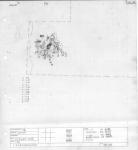Interpretation
-
- This stratum is interpreted as fill relative to the use of the hearth. This cut which it fills would have been relative to the kiln structure itself and would have filled the hearth after its final use and abandonment.Notable is the high concentration of animal bones charcoal and broken ceramics
-
- Darian Marie Totten
- 6-7-2009
Site Photo
- No records attached.
Description
- color, consistency
- sandy silt
- dark brown
- friable
- no later intervention
- accumulation
- semi-worked stones
- bone fragment charcoal
- brick fragments
- Dark soil stratum at interior of SU 8083 distinguished by color and consistency. The top of this stratum was marked by medium stone inclusions of semi-worked stone and brick fragments that while concentrated near the top were present. Also in lower concentration throughout the stratum. The other inclusions of smaller size were found randomly distributed throughout the friable soil matrix and the charcoal concentration was high. This stratum had a thickness of 16 cm. The limit of this stratum was defined by the presence of a new stratum with more compact consistency and clayey composition.
- this stratum was excavated in its entirety
Ceramic Inventory
- 1175 AD - 1299 AD
- Parete di anfora romana stondata e riusata come coperchio
| Total fragments | |
|---|---|
| 1 | |
| 2 | |
| 6 | |
| 3 |
Basic Information
- Friable stratum at the interior of cut US 8087
Plan
Record Details
-
- Lisa Fentress
-
- Darian Marie Totten
- 6-7-2009
- Ismini Miliaresis
- 6-7-2009
